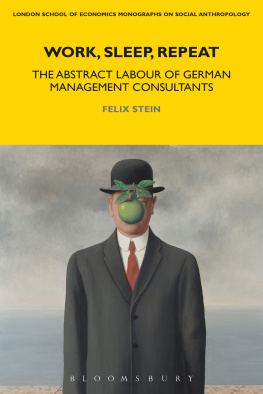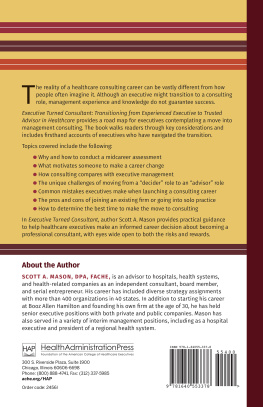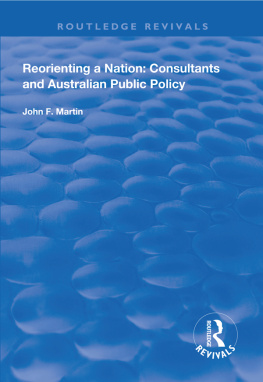Work, Sleep, Repeat
LONDON SCHOOL OF ECONOMICS MONOGRAPHS ON SOCIAL ANTHROPOLOGY
Managing Editor: Laura Bear
The Monographs on Social Anthropology were established in 1940 and aim to publish results of modern anthropological research of primary interest to specialists. The continuation of the series was made possible by a grant in aid from the Wenner-Gren Foundation for Anthropological Research, and more recently by a further grant from the Governors of the London School of Economics and Political Science. Income from sales is returned to a revolving fund to assist further publications. The Monographs are under the direction of an Editorial Board associated with the Department of Anthropology of the London School of Economics and Political Science.
Dedicated to my nieces Sara and Louisa, in the hope that the work they find some day will be fulfilling .
Work, Sleep, Repeat
The Abstract Labour of German Management Consultants
FELIX STEIN
LONDON SCHOOL OF ECONOMICS MONOGRAPHS ON SOCIAL ANTHROPOLOGY
VOLUME 83
Bloomsbury Academic
An imprint of Bloomsbury Publishing Plc

CONTENTS
I would like to acknowledge a great debt to my colleagues, friends and interviewees in the German consulting sector. They often had to squeeze interviews into very short weekends and all of them trusted that I would anonymize their identities.
I am equally grateful for the unceasing support from my PhD supervisor Sian Lazar. With relentless encouragement she has guided me through many difficult situations and continuously provided important challenges to my ideas.
Laura Bear, Chris Hann, Elizabeth Hull, Deborah James, Giulia Liberatore and Maryon McDonald have also generously dedicated much of their time to previous drafts of this book. Their lucid insights have improved it substantially.
The arguments presented here have also benefited from the Cambridge Writing-Up Seminars, organized in a most supportive spirit by James Laidlaw. Thanks go to him and to Lys Alcayna-Stevens, Oliver Balch, Ben Belek, Ryan Davey, Clara Devlieger, Marilena Frisone, Sazana Jayadeva, Chau Minh Lam, Matthew McGuire, Patrick McKearney, Patrick OHare, Alexander Orona, Falk Parra-Witte, Joseph Philp, Yu Qiu, Marlene Schfers, Steve Schiffer, Serta Sehlikoglu, Jonas Tinius, Max Watson, Tom White and Rachel Wyatt. I also would like to thank Matei Candea and Susan Bayly for their ongoing backing during my time at Cambridge.
The accidental nature of the research that led to this book meant that it was a highly unlikely project from the start. I therefore greatly relied on the encouragement and support of friends to see it through. I would like to thank Blandine Bnzit, Nick Courtman, Igor Dolgalev, Emmanuel Freudenthal, Sarah Ganter, Christian Hampel, Paolo Heywood, Nick Levine, Steven Lowe, Ana Isabel Lpez, Emily Parker, Tobias Pforr, Laura Sauls, Alexa Steinberg, Alice Thorpe, Janice Winter and Jonathan Woolf for being incredibly supportive.
Much of the research funding underpinning this book has generously been provided by the Heinrich Bll Foundation and the Wenner-Gren Foundation. Salary support during copy-editing has been provided by the Wellcome Trust, grant number 106635/Z/14/Z.
My warmest thanks go to my family. My parents Bernhard and Ruth Stein, my uncle Joseph M. Wiesbacher, my sister Andrea and my brother Sebastian have always shown great faith in my decisions. They remain a tremendous source of love and inspiration.
Translating many of the expressions of my mostly German colleagues and informants into English was surprisingly difficult. On the one hand, consultants used a lot of fairly specific terms that slightly change meaning when rendered into English. I have decided to translate most of these, so as not to interrupt the flow of the writing too often. However, on the few occasions when these terms seemed particularly semantically rich or insightful, I have added the German original as a footnote.
On the other hand, German consultants used Anglicisms (both English terms and German-English neologisms such as versliden) with astonishing frequency. I have put them in italics in the body of the text, and sometimes added them as footnotes. While Anglicisms are readily used in Germany, the public awareness of the distinction between German and foreign expressions remains strikingly high (Hilgendorf 2007: 143), which made their ubiquity in consultancy speech and thought all the more remarkable. Anthropologists and linguists have long pointed out how linguistic ideologies and practices are involved in establishing and reproducing notions of modernity, globalization and internationalization (Bauman and Briggs 2003; Clyne 1995: 201). I hope that leaving the Anglicisms in the text fosters the argument that consultants try to personify market values associated with modernity and internationality.
Moreover, I take the frequency of Anglicisms to have two additional effects. First, these terms created considerable semantic opacity for German listeners. This has often been deplored and joked about by the media and by my colleagues, as few of the latter were sure what was really meant by having strong people skills or by going the extra mile . One of my colleagues even went so far as to publish a blog post on a subsection of the company intranet, arguing that we should stop using them altogether as he considered them inherently vacuous, confusing and unnecessary. I contend that the frequent use of Anglicisms in an environment that is often described as one of knowledge production points to the high degree in which consultants valued the social effects of language, rather than just its representational accuracy.
Finally, it is also worth mentioning that English management expressions often replaced existing, clear and useful German terms that continued to bear negative connotations by being associated with the Third Reich. In a country that is still very much attempting to come to terms with its own past (von Bieberstein 2016), the frequent use of business lingo regarding leadership , team work or management skills allows German consultants to make reference to notions of order, discipline and hierarchy, without using the heavily and now often humorously charged fascist terminology of being a Gruppenfhrer or Gruppenleiter (cf. Clyne 1996: 2001; Parkes 1997: 167).
All three of these aspects of language use their reference to modernity and global connectedness, their opacity and their allusion to notions of order, discipline and hierarchy will be relevant to the argument presented in this book, which holds that German management consultants primarily work to alter the social relationships of corporate life.
The year 2011 marked a peak in Europes greatest economic and fiscal crisis in recent history. Greeces potential exit from the continents currency union seemed to threaten the future of the Euro, and government representatives struggled to make policy reforms on the fly. At the same time, people around Europe protested for greater socio-economic equality (e.g. The Washington Post 2011). As a result of the global financial meltdown three years earlier, several European governments had become so indebted that they were now unable to borrow money on bond markets. Without the option of devaluing their currencies, they were forced to request loans from the European Union and the International Monetary Fund (IMF), who in turn required them to implement so-called austerity measures, meant to allay the concerns of financial analysts and corporate investors (Lane 2012). The resulting mixture of reduced government spending, dried-up banks, stagnant economic growth and severe worker disenfranchisement led European unemployment levels to new record highs. In Spain, about a fifth of the entire labour force was without a job that year, while in Ireland and Greece, relative unemployment had doubled since 2008. People fortunate enough to keep their jobs often faced great losses in real income and increasingly precarious working conditions. Pensioners and the unemployed, particularly around the Mediterranean, were similarly forced to shoulder much of the burden of failed national and regional economic policies of the past decades.









